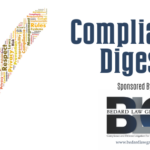I’m thrilled to announce that Bedard Law Group is the new sponsor for the Compliance Digest. Bedard Law Group, P.C. – Compliance Support – Defense Litigation – Nationwide Complaint Management – Turnkey Speech Analytics. And Our New BLG360 Program – Your Low Monthly Retainer Compliance Solution. Visit www.bedardlawgroup.com, email John H. Bedard, Jr., or call (678) 253-1871.

Every week, AccountsRecovery.net brings you the most important news in the industry. But, with compliance-related articles, context is king. That’s why the brightest and most knowledgable compliance experts are sought to offer their perspectives and insights into the most important news of the day. Read on to hear what the experts have to say this week.
Judge Grants Motion to Remand Case After Plaintiff Fails to Appear for Deposition
A District Court judge in Wisconsin has granted a plaintiff’s motion to remand a Fair Debt Collection Practices Act case back to state court where it was originally filed, while also declining to rule on a defendant’s motion for sanctions against the plaintiff and his attorney and another defendant’s motion for judgment on the pleadings. More details here.
WHAT THIS MEANS, FROM CHELSEY PANKRATZ OF FROST ECHOLS: Despite failing to participate in discovery, and failing to respond to several other discovery and substantive motions filed in the meantime, pro se Plaintiff in this case filed a motion to remand eleven months after the case was removed, which the court here granted. Although Plaintiff hired an attorney at the time that the case was removed, Plaintiff had filed his original complaint in state court without the assistance of counsel, which the court noted in its ruling. The court held that Plaintiff’s vague and conclusory allegations of “costs, loss of credit opportunities, and stress” failed to provide a basis on which the court could find standing based on a tangible economic harm, and thus granted the motion to remand. However, the court did deny Plaintiff’s request of for costs and fees associated with the motion to remand, acknowledging that Plaintiff “wasted significant court and defense resources” by failing to participate in discovery, respond to the prior motions and waiting to raise the standing issue until eleven months after removal.
THE COMPLIANCE DIGEST IS SPONSORED BY:

Judge Recommends Granting MSJ for Defendant in FDCPA Case Over Used Car
A Magistrate judge in Oregon is recommending that a defendant’s motion for summary judgment be granted in a Fair Debt Collection Practices Act case dealing with the purchase of a used car that turned out to be a lemon. More details here.
WHAT THIS MEANS, FROM MITCH WILLIAMSON OF BARRON & NEWBURGER: This case stands for the principle. You get what you pay for. Mr. Watson bought a used car from Uwe Schroeder, a car which could only be described as a lemon. Watson started to make payments and when the car stopped, so did the payments. Based on the record, the car spent more time in the shop then on the road. At one point Schroeder told Watson to hold off payments until they got the car back on the road. After two years, the mechanic, who appeared to spend more time with the car than Watson, advised Watson that he was going to find him a new engine, which Watson “could use as an installment and install himself.” Unexplained, but at some point, Schroeder decided to hire Hornecker Cowling (“Cowling”), a local law firm, collect the balance due on the Bill of Sale and Purchase Order.
Having read the above, you have to wonder why anyone thought it was a good idea to go after the balance due for the lemon, I mean car. But they did and after sending Watson a letter, and getting no response Cowling filed suit. (Watson did in fact respond to the initial letter, but only to Schroeder.) Shortly thereafter Watson filed the suit under discussion and subsequently there were cross motions for summary judgment.
Cowling won and Watson lost for two key reasons. First, the car was sold as is with no warrantees and all the fees and amounts sought in the collection lawsuit were spelled out in the sale papers. As a result, the court found that any claims of deception, using unfair and unconscionable means to collect a debt were negated by the terms which Watson agreed to when he purchased the car. Secondly, the court found that Cowling was entitled to the bona fide error defense because, they reasonably relied on their client’s papers and Watson never notified Cowling of any dispute to cause the to question that reliance.
So, the moral of the story is, good paper work trumps a crummy deal.
Judge Grants MJOP for Defendant in FDCPA Class-Action Over Different Reference Numbers in Letters
A District Court judge in Minnesota has granted a defendant’s motion for judgment on the pleadings in a Fair Debt Collection Practices Act class-action lawsuit that was filed because the plaintiff received two collection letters from the defendant and each provided a different reference number and PIN for the plaintiff to access the debt via the defendant’s portal. More details here.
WHAT THIS MEANS, FROM PATRICK NEWMAN OF BASSFORD REMELE: Believe it or not, the most direct commentary on this type of claim actually comes from the case law. It’s one of my favorite “marquee quotes” in this area of the law. Ready?
“The unsophisticated consumer may be uninformed, naïve, and trusting but is not a dimwit, has rudimentary knowledge about the financial world, and is capable of making basic logical deductions and inferences.” Lox v. CDA, Ltd., 689 F.3d 818, 822 (7th Cir. 2012) (cleaned up, quotations and citations omitted).
In other words, the famed FDCPA consumer, unsophisticated though they may be, would have no trouble assessing the use of a different reference number between two collection notices. Correct result reached.
TRACED Act Author Back With New Anti-Robocall Bill
A bill has been introduced in the House of Representatives — by the author of the TRACED Act — to close the “loophole” created by the Supreme Court in the Facebook v. Duguid ruling and provide consumers with more protections against robocalls and the growing use of artificial intelligence in facilitating robocalls. More details here.
FCC Seeks to Make AI-Generated Robocalls Illegal Under TCPA
The chair of the Federal Communications Commission yesterday proposed making calls using voices generated by artificial intelligence artificial voices under the Telephone Consumer Protection Act, which would make the voice cloning technology used in robocall scams illegal. The move is likely a reaction to a robocall that was made last week to thousands of residents of New Hampshire, on the eve of that state’s primary, and used an AI-generated voice that sounded like President Joe Biden. More details here.
Bill Introduced in House to Crack Down on AI Robocalls
The Federal Communications Commission is not the only entity seeking to criminalize the use of artificial intelligence in the area of robocalls. A bipartisan bill has been introduced in the House of Representatives that would require callers to disclose when artificial intelligence is being used and increases the penalties for using AI to impersonate individuals. The bill is part of larger package of bills that is being spearheaded by Rep. Frank Pallone [D-N.J.]. More details here.
WHAT THIS MEANS, FROM HEATH MORGAN OF MARTIN GOLDEN LYONS WATTS MORGAN: These three regulatory developments from last week show the increased scrutiny artificial intelligence is receiving as it relates to phone calls. This is in addition to the 289 proposed state bills and laws that have been introduced for the 2024 session.
These three regulatory proposals represent attempts to use the TCPA as a sword in attacking the increased scams from artificial intelligence robocalls, calls that are only expected to increase during the upcoming election season. The ARM industry has had ongoing conversations on how AI can be used for consumers benefit and company efficiencies, with the understanding that AI can and likely will increase the prevalence of scams. The industry also has concerns that bills may be passed that are too broad in their definition, including the proposed H.R. 7116, which seeks to vastly broaden the definition of robocall and prerecorded voice that would include common uses within the ARM industry. These bills also include broad definitions of the term artificial intelligence which include technology uses that are not true artificial intelligence. It is especially important for industry stakeholders to engage and participate in these legislative efforts to make sure the final version do not hinder the industry’s lawful use of technology. It is also an opportunity for the industry to reach across the isle and help advocate for the safe and responsible use of AI that does not hinder legitimate AI use.
These efforts should also extend to the FCC proposal and it’s recent Notice of Inquiry to learn about how AI impacts robocalls and robotexts. While these bills and the FCC proposal still have a long way to go before becoming law, it is important for the industry to participate in stakeholder conversations to help shape these laws. Industry members that have existing relationships with legislators should reach out and offer to engage in proposed AI legislation, as these efforts will only continue throughout the next year.
I’m thrilled to announce that Bedard Law Group is the new sponsor for the Compliance Digest. Bedard Law Group, P.C. – Compliance Support – Defense Litigation – Nationwide Complaint Management – Turnkey Speech Analytics. And Our New BLG360 Program – Your Low Monthly Retainer Compliance Solution. Visit www.bedardlawgroup.com, email John H. Bedard, Jr., or call (678) 253-1871.













